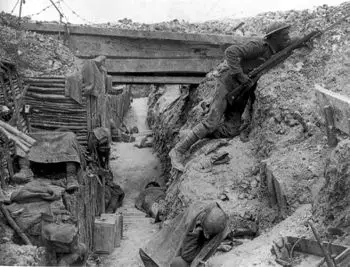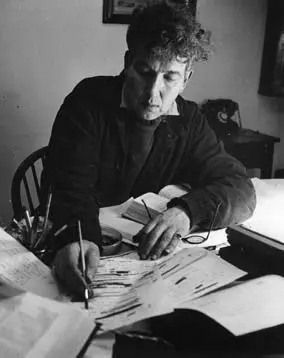Good-Bye to All That by Robert Graves - Book Review
By Carol Costello
Initially published in 1929, Good-Bye to All That is the autobiography of author and poet, Robert Graves.[1]In his introduction to the book, author and World War II veteran Paul Fussell states that this is “the best memoir of the First World War.” He may be right. Graves, who was a captain in the Royal Welch Fusiliers, writes of his life from being raised in a well-to-do family, his experiences at boarding school, his activities during World War I, and how the war impacted his future. Aside from being an indispensable tool for teaching about the Great War, this book is also an excellent resource for social history and literary criticism. Students, formal and otherwise, young and old, will discover for themselves to what Graves is saying good-bye.
Robert Graves said good-bye to many things; militarism, class distinction, mindless chatter, organized religion, and most especially, authority. At the root of all of these “good-byes” was his desire to be rid of political, religious, and societal pretenses. As a young boy, he was constantly exposed to the belief that one social and financial class was superior to another. Graves himself witnessed the class distinction himself as a child when he engaged in sports. Prior to exposure to a diverse group of youngsters playing cricket, Graves had been raised in a culturally homogenous setting. He gives an example of being hospitalized as a child when he contracted Scarlet Fever. In the hospital ward, the similarly afflicted boys were all dressed alike in hospital gowns and suffered in the same manner. There was no evident distinction between the boys as they were all in uniform dress and condition. When he learned to play cricket; however, he realized that the boys with whom he was playing were not of the same socio-economic class as himself. Their dress, deportment, and manners were all vastly different from what Graves had previously been exposed. Graves remembered this and later describes the soldiers in the trenches and the blurred lines of authority during battle.
Having endured the domination of Masters and upperclassmen at his boarding school, Charterhouse, one might assume Graves to be a natural fit for the military. He was a commissioned officer at a young age yet found it difficult taking his first command over seasoned and experienced soldiers. Graves exposes his great humility when describing his feeling of inadequacy when standing before these men. This also highlights his difference from other officers in that he was keenly aware that rank, like social class, did not make him superior. This humble and logical notion was glaringly absent among his commanding officers. His gives the example of his first visit to the trenches and his exposure to the different classes of soldiers. The trench soldiers lived where they fought. They slept outside in the elements and ate the same limited food daily. Upon arriving at battalion headquarters, he noticed tablecloths, glassware, and other amenities reminiscent of home. The officers were relatively clean and living in a civilized manner while the men who were doing the actual fighting were denied even a clean pair of socks.
Graves also differed from other officers as he entered into the military in response to the war and not for the purposes of a career. He was naively eager to go to war and did not want to sit at a civilian post. He was not impressed with polished buttons and snappy salutes. Like most of the combatant countries, he believed the war would be brief. By the time the conflict finally ended, Graves emerged from the service as a disillusioned man with regard to the importance of authority and political posturing.
Graves describes himself as a socialist in his post-war life. He was vexed with the problem of sending his children to a village school where they would be exposed to organized religion and snobbery. While in the military and at Charterhouse, he endured forced obedience and did not want his children to suffer the same fate. This is when he at last bid farewell to unnecessary obedience he experienced and came to view it as nothing more than societal posturing.
By the end of the Great War, Robert Graves swore two things; he would never again be subject to someone’s authority, and he would never again make England his home. The latter idea began to manifest when he was home from France on leave during the fighting. At a gathering at his family’s home, people were speaking of their fear of being bombed by Germany’s Zeppelin. Graves recounted to them a story of when he was in France and a bomb fell three houses away from where he was sleeping. When one of his guests commented that it was irrelevant because it was “only France” and not England, graves sarcastically noted that it was only dropped from an airplane and not the feared Zeppelin. This is when he began to think that he needed to say good-bye to the supposedly liberal people of England, who only seemed concerned with themselves.
Robert Graves did indeed say good-bye to many things yet never yielded his dignity, thus never bid farewell to his self-respect. According to Shakespeare, “All the world’s a stage, the men and women only players.” Robert Graves no longer wanted to be on the stage.
Related Articles
- How did Mussolini Rise to Power as the Dictator of Italy
- Why did the United States refuse to join the League of Nations after World War I
- Why did the United States declare war on Germany during World War I in 1917
- What was Blitzkrieg and Who Created it
- How did Hitler become the Dictator and Fuhrer of Germany
- The Treaty of Versailles: A Concise History by Michael S. Neiberg - Book Review
- Gallipoli by Jenny MacLeod - Book Review
- Why did the Weimar Republic Collapse
- Who helped Lawrence of Arabia shape the Arab Revolt
- What Were the Causes of Germany's Hyperinflation of 1921-1923
- Why did the German Spring Offensive of 1918 fail
References
- ↑ Robert Graves, Good-Bye to All That (1929, repr., New York: Anchor Books, 1998).


